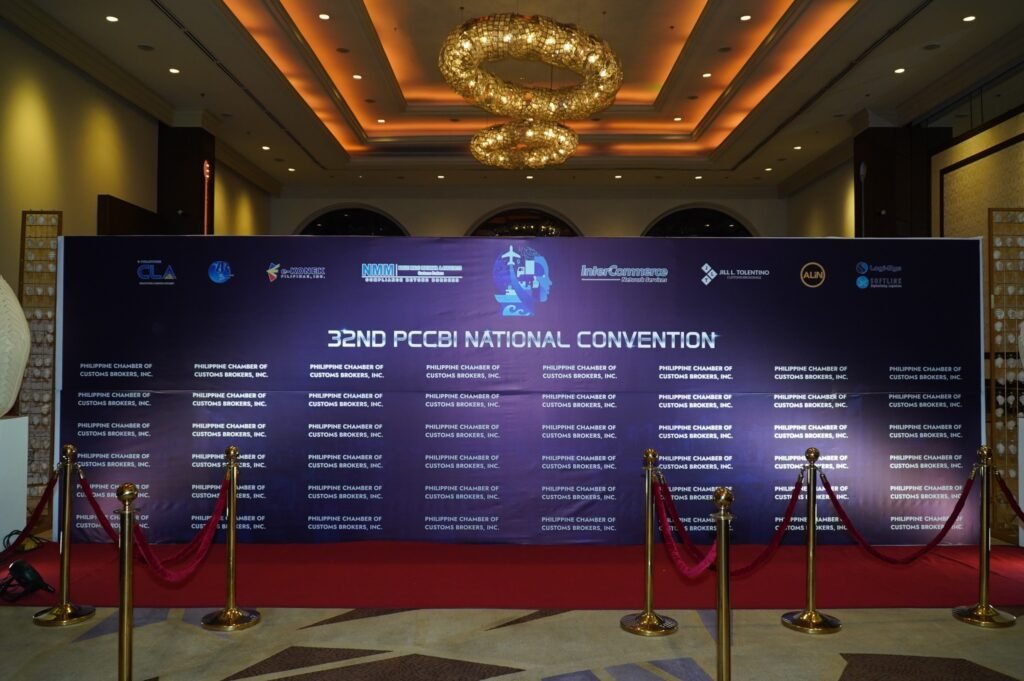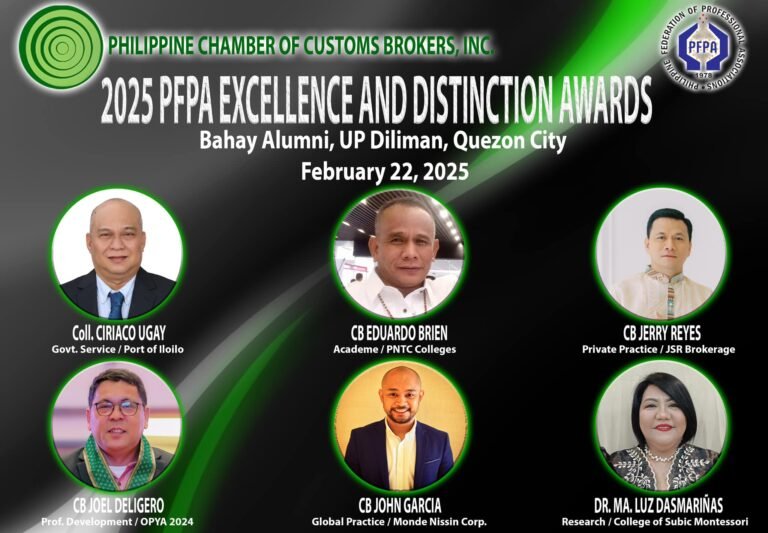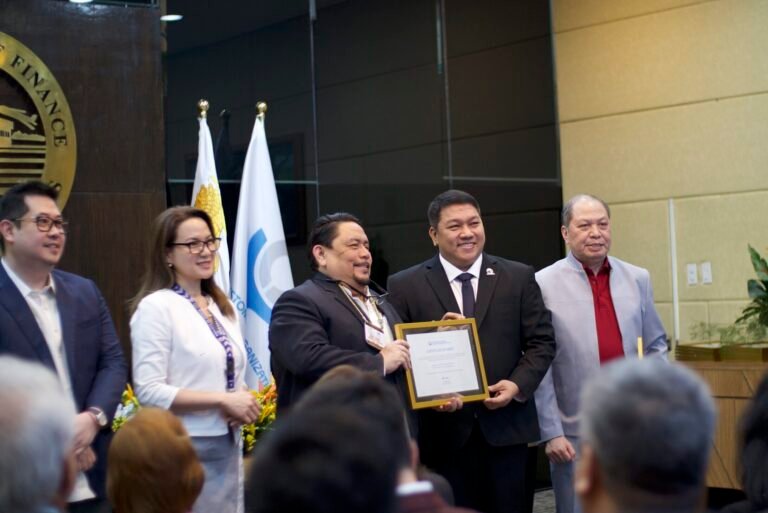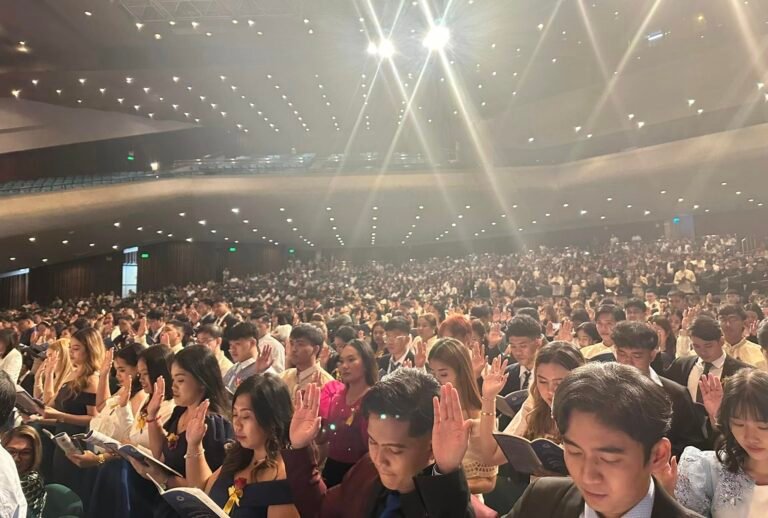Manila, Philippines – On November 29, 2024, the Philippine Chamber of Customs Brokers, Inc. (PCCBI) successfully hosted its 32nd National Convention at the Manila Hotel, attracting over 3,000 customs brokers and distinguished guests from various government agencies. The event, themed “The Evolving Role of Customs Brokers in International Trade and Governance in an AI-Driven World,” sparked important discussions on how emerging technologies like artificial intelligence (AI) are changing customs, logistics, and trade.
The 32nd National Convention highlighted the role of customs brokers in a digital and automated world. Industry leaders and experts discussed how AI is being integrated into customs processes, exploring its impact on imports/exports, government initiatives, and the future of trade. Director Hombre, a key speaker, stressed the growing importance of big data and analytics in improving customs risk management.
PCCBI National President Dr. Anthony Cristobal led the preparations for the successful 32nd National Convention. Together with Head Committee EVP Jill Tolentino, they engaged over 3,000 professionals through careful planning, coordination, and aligning the event’s theme with global trade trends. Cristobal’s leadership emphasized the need to evolve customs practices in an AI-driven world.
Subscribe to the MyCCBI365 newsletter
Behind National Convention
Dr. Anthony Cristobal delivered a comprehensive report on the organization’s previous and recent activities, providing an update on its current status to ensure transparency. Addressing the members, Chapter Presidents, and officers, his report highlighted key accomplishments, ongoing initiatives, and future plans, reinforcing the commitment to open communication and fostering trust within the organization.
National Convention Athmosphere
The 32nd National Convention created a positive atmosphere where attendees experienced camaraderie, learning, and the chance to earn CPD units. Participants had opportunities to meet public officials from various government agencies, helping strengthen relationships and build valuable connections. This event allowed customs brokers to engage with industry experts and gain new insights into the field. It also provided a great platform for enhancing knowledge on the latest trends in customs and trade. Customs brokers walked away with not only a deeper understanding but also CPD credits, making the convention a rewarding and enriching experience for everyone involved.
Insights on UN Global Survey on Trade Facilitation
During a recent event, Acting MISTG Deputy Commissioner Marlon Fritz Broto shared important insights from the UN Global Survey on Trade Facilitation. He focused on key areas changing the global trade landscape. The survey highlights both digital and sustainable trade solutions, showing how countries, including the Philippines, are adopting new ways to improve trade efficiency.
–Digital and Sustainable Trade Facilitation – Deputy Commissioner Broto started by discussing the survey’s findings on General Trade Facilitation (TF), highlighting the importance of transparency, formalities, transit, and institutional cooperation in trade. The UN survey emphasizes the need for efficient and transparent systems across borders to ensure smoother trade. Broto mentioned that the Philippines has made progress in improving transparency and simplifying processes to boost trade and integrate globally.
–Digital Trade Facilitation: Paperless Trade and Cross-Border Paperless Trade – Broto then explained the shift toward digital trade and paperless systems. Many countries are moving to digital platforms to replace paper processes, which reduces costs and speeds up trade. The Philippines is investing in digital infrastructure like electronic invoicing, automated customs clearance, and digital documentation to make trade smoother. These innovations are transforming the country’s trade landscape and positioning it as a digital trade leader in Southeast Asia.
–Sustainable Trade Facilitation – Supporting SMEs, Agriculture, and Women – Broto focused on Sustainable Trade Facilitation, which supports small businesses (SMEs), agriculture, and women in trade. The survey highlights that empowering these groups is key to fair and sustainable trade. Broto pointed out that the Philippines is increasingly supporting SMEs, farmers, and women entrepreneurs by giving them access to technology, financing, and markets. This strategy helps reduce poverty and promotes inclusive growth.
–Other Trade Facilitation Areas: Trade Finance and Crisis Management – Deputy Commissioner Broto also discussed trade finance and the role of trade facilitation during crises. The survey shows that trade finance is essential for businesses to access the funds needed for international transactions. The Philippines scored 87.10% in trade finance accessibility, ranking second in Southeast Asia. This shows the country’s strong efforts to improve financial systems for trade. Broto also highlighted how the Philippines is prepared for trade challenges during crises and emphasized efforts to keep trade flowing and businesses recovering quickly.
–Ongoing Improvements for a World-Class Trade Environment – Broto ended by reiterating that the Philippine government is dedicated to continually improving its trade facilitation systems. This commitment aims to make the country a top global hub for trade. The government’s investment in digital technology, sustainable practices, and empowering key sectors will drive this transformation. As the Philippines aligns with global standards, it will continue to grow its role in international trade and help local businesses succeed in a changing world.
AI-Powered Customs Risk Management
Director Hombre shifted the focus to AI, explaining how machine learning and AI are transforming customs operations for better enforcement and efficiency.
AI-Powered X-ray Imaging: AI helps analyze X-ray images more accurately, aiding customs officers in spotting illegal goods and contraband.
Enhanced Risk Profiling: AI improves risk segmentation, allowing customs to perform targeted inspections using advanced risk profiles.
Automating Customs Inspections: AI feedback loops refine risk management models, improving customs profiling and detection accuracy over time.
AI Chatbots and Robots: AI chatbots manage public inquiries, while robots, tested at airports and ports, assist both travelers and customs officers.
Cross-Platform Cyber Patrols: AI boosts cybersecurity by scanning online platforms to detect fraud and prevent cyber threats targeting customs systems.
AI-Driven Automation: AI automates tasks like market price research and customs clearance, cutting down on manual work and improving efficiency.
Big Data in Customs Enforcement: A Game Changer
Director Hombre shared how data mining and intelligence gathering have transformed customs enforcement, making it more efficient and improving compliance.
Data Mining for Intelligence: Customs can analyze large amounts of financial and tax data to spot suspicious transactions and improve compliance.
Fighting Smuggling and Tax Evasion: By studying patterns and trends, customs can detect illegal trade activities and prevent tax evasion.
Protecting Intellectual Property: Data analysis, including internet mining, helps prevent intellectual property violations and stop counterfeit goods from entering markets.
Improving Revenue Collection: Analyzing import/export data enables customs to adjust pricing strategies and improve public revenue collection.
The 32nd National Convention proved to be an eye-opening event, offering valuable insights into how customs brokers must adapt to the evolving landscape of international trade. As technology continues to shape the future, the role of customs brokers in ensuring the smooth movement of goods while maintaining compliance will become even more crucial. This convention was a significant step in preparing for the challenges and opportunities presented by an AI-driven world.









